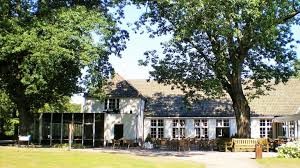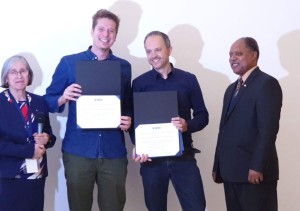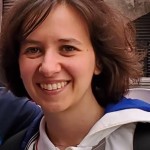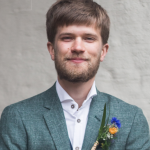Dear all,
 The days are drawing shorter and Winter is coming, welcome to the November newsletter!
The days are drawing shorter and Winter is coming, welcome to the November newsletter!
The first DISC course, Multi-agent Network Dynamics and Games, started and finished in October and we will resume our program in January. As most of you know we have changed the requirements for the DISC certificate per 01-01-2020 and we recapitulate the new rules in this newsletter.
The Benelux Organisers are doing a wonderful job and have secured to further speakers: Thomas Schön and Marcel Heertjes. We are working on the new website an will launch that soon!
With best regards,
Henk Nijmeijer,
Scientific director
Martha Otte,
DISC secretariat

The Organising Committee has the pleasure to invite you to participate in the 39th Benelux Meeting on Systems and Control. The meeting will be held from March 10-12, 2020 in “Hotel Mennorode”, Elspeet, the Netherlands.
Confirmed speakers:
Thomas Schön, Uppsala University, Sweden
Kristin Pettersen, Norwegian University of Science and Technology
Ming Cao, University of Groningen
Marcel Heertjes, Eindhoven University of Technology and ASML
More information will follow soon!
In January 2020 the following classes will start:

Dr. J. Polderman, University of Twente
Prof. H. Trentelman, University of Groningen
Prof. K. Camlibel, University of Groningen
Nonlinear Control Systems
Prof. B. Jayawardhana, University of Groningen
Prof. B. Besselink, University of Groningen
For the full list of courses for 2019-2020 see: https://disc.tudelft.nl/education/course-program/2019-2020-course-program/
Register on the DISC course platform.
The courses are taught at cursus en vergadercentrum Domstad in Utrecht, location Koningsbergerstraat 9. For more information see their website.
As from 01-01-2020 the requirements for obtaining a DISC certificate will change. From this date students will receive a certificate when they have acquired 21 ECTS or more. We are aware that students need to meet
the requirements of their local graduate school and by implementing these changes we hope to ensure that students will remain interested in obtaining a DISC certificate.
In the table below we specify the requirements for the 21 ECTS certificate
| DISC certificate | |
| DISC courses | ≥ 75% (min. 16 ECTS) |
| Non-DISC PhD courses |
max. 5 ECTS |
| MSc courses | |
| Presenting a paper during Benelux Meeting | (1 ECTS per presentation) max. 2 ECTS |
| Obtaining a DISC certificate gives the student the right to:
Include the DISC logo in their thesis Be nominated for the DISC Best Thesis Award |
|
The text on the certificate will read: “A course certificate is awarded to anyone who has completed a course program of at least 21 ECTS credits offered or approved by the Dutch Institute of Systems and Control, DISC. DISC is an interuniversity graduate school and research institute in the area of systems and control, founded on January 1, 1995.”
On the grade list we will clarify the meaning of the grades ( 10 exceptional, 9 excellent etc.) and also specifically mention the total amount of ECTS credits a student has obtained so that it is noticeable when students have more than 21 ECTS.
At the Benelux Meeting in 2020 we will have our annual certificate ceremony and in the coming months I will contact all PhD’s who are currently employed by one of the DISC departments and who have 21 ECTS or more to ask them if they wish to receive a certificate.
 David Abbink and Max Mulder received an award at the IEEE SMC2019 conference for their long-term collaboration in the field of cybernetics research: the award for the best SMC journal paper.
David Abbink and Max Mulder received an award at the IEEE SMC2019 conference for their long-term collaboration in the field of cybernetics research: the award for the best SMC journal paper.
The paper provides an overview of manual control cybernetics, as advanced in the last two decades by Max Mulder (AE) (first author) in collaboration with many colleagues in his lab (Daan Pool, Rene van Paassen, Peter Zaal, Frank Drop and Kasper van der El) and the CoR lab (David Abbink and Erwin Boer). The paper state-of-the-art and future trends for models and identification techniques to disentangle the multiple nested loops of neuromuscular, vestibular and visual control in human manual control behavior.
Dariu Gavrila has received the Outstanding Research Award 2019 from the IEEE Intelligent Transportation Systems (ITS) Society for his work on “Active Vulnerable Road User Safety with focus on vision-based pedestrian and cyclist detection, motion modelling and path prediction”.
The award was presented yesterday during the plenary opening of the IEEE Intelligent Transportation Systems Conference (ITSC) 2019 in Auckland, New Zealand.
The course Networked Control of Multi-agent Systems, of the International Graduate School on Control, will be organised on February 10 – 14, 2020 at Eindhoven University of Technology (The Netherlands) lectured by Prof. Jan Lunze (Bochum, Germany).
This module will be taught for PhD students and Master students with basic knowledge in linear control. It covers important methods for the analysis of networked systems and the design of synchronising controllers. The focus will be laid on the question, which information links among the controlled agents have to be used to satisfy the performance requirements on the overall system. Examples ranging from vehicle platoons to electric power systems will illustrate the methods.
Registration: http://www.eeci-igsc.eu/
Flyer: EECI-NetworkedControl20
Delft University of Technology
 Name: Andrés Fielbaum
Name: Andrés Fielbaum
Starting date: 01-11-2019
Function: PostDoc
Email: A.S.FielbaumSchnitzler@tudelft.nl
Group: CoR
I am Andrés Fielbaum, a mathematical engineer and Ph.D. in Transports Engineering from Universidad de Chile. There are many challenging questions regarding how to improve public transport systems to fight congestion, pollution, and inequalities; my research deals with public transport design, its operational rules, and its economic analysis. In particular, I am very interested in how to use new technologies for this purpose, as they have great potential but they can also be risky if not used wisely; my postdoc here focuses on designing transit systems that use autonomous vehicles, and that can work on-demand, with traditional fixed lines or combining both alternatives. This work will be performed in the Autonomous Multi-Robots Lab., under the supervision of professor Javier Alonso-Mora, starting November 1th. On the other hand, public transport problems induce new questions that can be researched from a (combinatorial) optimization point of view; achieving a creative synergy between transport and math theory is a crucial objective for me.
Since I was an undergraduate student, I have had an intense politic activity. I was the spokesman of the Chilean university students during 2013, and nowadays I participate in the political party Comunes, which is part of Frente Amplio. I am a big football fan, although I am not so good when playing it; I play table games better.
Eindhoven University of Technology
 Name: Elena Torta
Name: Elena Torta
Starting date: 14-10-2019
Function: Assistant professor
Email: e.torta@tue.nl
Group: CST
Supervisor: René van de Molengraft
I am a former PhD candidate of TU/e from which I graduated in February 2014. My thesis and research activities covered topics in human-robot interaction, robots’ navigation and technology evaluation with laboratory studies and field trials.
Shortly after graduation, I joined ASML. At ASML, I rapidly grew from software developer to lead engineer, software architect and algorithm deployment competence leader. I have been involved throughout my corporate career in innovation projects related to model based engineering. I join the CST group with the ambition to provide a substantial contribution to model based engineering methods for the development of autonomous robots and human-robot interaction.
University of Groningen
 Name: Jasper Verbree
Name: Jasper Verbree
Function: PhD candidate
Starting date: 01-11-2019
Email: j.verbree@rug.nl
Group: Optimization and Decision Systems
Supervisor: A.K. Cherukuri
Project: Decision making in smart transportation networks
I’m a Dutch student in Applied Mathematics. My master was at the University of Groningen(Rug), focused on Systems and Control, and I finished it in April of 2019. Now I am pursuing a PhD at the ENTEG institute, studying routing games.
Decision making in smart transportation networks.
In this research project we study traffic networks from the point of view of game theory. The travellers on a traffic network can be seen as ‘players’, each of which is trying to minimize the needed time to travel from its origin to its destination by making use of the ‘resources’ available, namely, the roads. As individuals make choices about which routes to take, popular roads become digested, and travel time increases accordingly. Eventually the network may settle in equilibrium, where the amount of traffic per road is constant, and all players are making optimal choices for the given network state. Such a constant state is called a ‘Wardrop equilibirum’ and this research project focuses on the properties of these equilibria under different assumptions. This set-up is known in the literature as a ‘routing game’ or a ‘congestion game’. Besides traffic networks there are other applications of this field of research, one instance of which is the design and control of communication networks.
Initially we will be looking at the inclusion of risk-averseness in the considerations made by the different players in a routing game. In addition to minimizing the costs (i.e. travel time), players may also want to limit the risks that they are taking by choosing a certain route. Various measures of risk may be considered and the existence and properties of the associated Wardrop equilibria effects studied.
Name: Jiaming Hu
Starting date: 1-11-2019
Function: PhD
Email: jiaming.hu@rug.nl
Group: Systems, Control and Applied Analysis
Supervisor: Stephan Trenn
Project: Impulse- and jump-free stabilization of switched DAEs
Jiaming Hu received his master degree from Shenyang Aerospace University, under the supervisor of Prof. Yiwen Qi. The title of Hu’s dissertation is Fault-tolerant bumpless switching control for switched systems. He studied in Shanghai University from 2017-2019 under the supervisor of Prof. Xiaojin Zhu, and his research area was vibration control. He is now a PhD student in University of Groningen. His supervisor is Prof. Stephan Trenn. His research interests include switched systems and differential algebraic equations.
Delft University of Technology
Candidate: Kimberley McGuire
Group: AE
Thesis: Indoor Swarm Exploration with Pocket Drones
Promotores: Prof.dr. K.P. Tuyls, Prof.dr. H.J. Kappen and Dr. G.C.H.E. de Croon
Date: 14-11-2019
Location: Aula, TU Delft
Time:10:00
Eindhoven University of Technology
Candidate: Robert van der Weijst
Group: CST
Thesis: Extremum seeking for robust fuel-efficient control of diesel engines
Promotores: prof. F. Willems, prof. N. van de Wouw and dr. T. van Keulen
Date: 11-11-2019
Time: 16:00
The next issue of this Newsletter will appear in December 2019.
We encourage the contributors to provide newsworthy information. In principle, we intend to publish any message offered. However, we reserve the right to edit certain parts of a submission.
Please send your contributions to: m.w.otte@tudelft.nl
You receive this newsletter because you are a member of DISC. If you want to be removed from the mailing list, please let us know by sending an email to m.w.otte@tudelft.nl